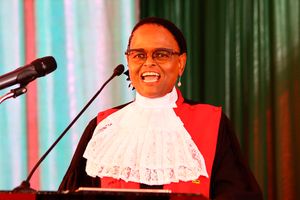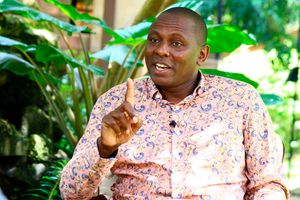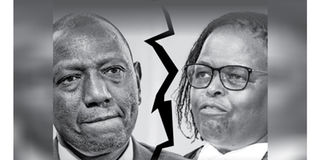
President William Ruto and Chief Justice Martha Koome. Dr Ruto’s controversial comments interpreted as a vow to defy unfavourable court rulings has raised issues.
The firestorm of protests kicked up by President William Ruto after controversial comments interpreted as a vow to defy unfavourable court rulings has raised issues not just about threats to judicial independence, but also signals of a creeping dictatorship.
All eyes now are on what happens next as the President, backed by a firm support from Kenya Kwanza politicians, doubles-down on his pledge to take action against allegedly corrupt judges; against strong opposition from an emerging broad coalition involving Azimio la Umoja One Kenya leader Raila Odinga, civil society, the legal fraternity and others over threats to the Judiciary.
The unproven allegations of corrupt judges derailing the Presidents pet projects—affordable housing and universal health care—have also provoked an unusually strong reaction from the Judiciary.
Chief Justice Martha Koome, who earned opposition opprobrium after the Supreme Court threw out Raila’s petition challenging Ruto’s 2022 presidential election victory, wrote to colleagues on the Bench urging them to ignore external pressures and continue discharging their duties without fear or favour.
She did not name names, but the Kenya Judges and Magistrates Association did not hesitate to name Ruto as the one whose utterances were a direct threat to judicial independence and calculated to intimidate officers handling ongoing cases involving the government.
Ruling party politicians such as Kikuyu MP and National Assembly Majority Leader Kimani Ichung’wah, Kiambu Senator Karungo Thang’wa and Nandi Senator Samson Cherargei have threatened various actions to tame an allegedly rogue Judiciary, but their separate initiatives tend to expose—save for the orchestrated chorus from the political platform—lack of a clear and coordinated strategy on how to proceed.
Interestingly, the government’s chief legal advisor, Attorney-General Justin Muturi, is in the dark on any specific moves against allegedly corrupt judges.

President William Ruto addresses mourners during the burial of Michael Maigo, father of Nyandarua Senator John Methu, in Njabini on January 2, 2024. He accused some members of the judiciary of derailing his government's development projects.
Also Read:Court cases to watch in 2024
Ichung’wah, in various media interviews, has said that the government will conduct something akin to the 2003 “radical surgery” of the Judiciary undertaken in the early days of President Mwai Kibaki’s regime— public complaints hearings by which nearly a third of High Court, Court of Appeal judges and magistrates were shown the door.
He also hinted at revival of a commission of inquiry into State capture, a Kenya Kwanza election pledge to look at alleged sins of Ruto’s predecessor Uhuru Kenyatta that was abandoned as soon as the new President took office.
Meanwhile, senators Thang’wa and Cherargei have publicly mooted separate initiatives through the Legislature aimed at bringing the Judiciary to heel.
But reached by The Weekly Review on Friday on whether the government is planning specific actions against the Judiciary as a whole or against specific judges facing allegations of misdeed, Muturi said that he was not aware. He however expressed surprise at public utterances that in his view exposed the ignorance of politicians.
“Statements are being made and sometimes I wonder where are we headed”, he said, adding that any inquiry into alleged judicial misconduct would have to have some solid basis.
He pointed out that the current constitutional dispensation is markedly different from 2003 when Kibaki launched the “radical surgery” driven by then Justice Minister Kiraitu Murungi.
That was a time of great political transition, when everyone was excited about change, and about removing holdouts from the Kanu dictatorship. At that time, short-circuiting the process for removal of judges was widely welcomed, which might not be the case today.
The 2010 constitution provides elaborate safeguards to ensure judicial independence and separation of powers.
The AG was scornful of some of the initiatives being touted by politicians, dismissing as total ignorance the assertion by Thang’wa that Uhuru had defied High Court orders against appointment of chief administrative secretaries (CASs) and nothing had happened.
The fact was that the High Court ruling had been stayed by the Court of Appeal and that remained the status quo till Uhuru left office. That was why, he explained, Ruto sought to correct the mistake by engaging the Public Service Commission and having public participation in his own appointment of CASs.
He urged MPs contemplating any action against the Judiciary to first familiarise themselves with the constitution and the various laws insulating the Judiciary from pressure or influence from the other arms of government or other external actors.
“These young men don’t seem to read what has happened,” (in relation to how those protections came into place), he said “they are excited about their new positions.”
While not privy to what might be in the works, he stressed that anything being planned must be in conformity with the provisions of the constitution, specifically the chapter on the Judiciary, which has very elaborate procedures on appointment, discipline and removal of judges.
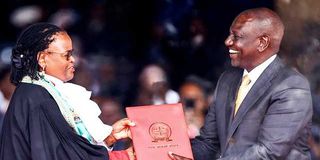
President William Ruto receives certificate from Chief Justice Martha Koome after taking oath of office on September 13, 2022.
Former Chief Justice Willy Mutunga and Senior Counsel Ahmednasir Abdullahi also weighed in in separate interviews with The Weekly Review on the ongoing discussions.
Both concurred with Muturi that any actions contemplated against judges must be managed in strict conformity with the law.
But they also differed in various aspects, with Mutunga seeing a malicious hand in the current campaign that follows on the government losing a succession of cases; while Ahmednasir enthusiastically supports Ruto’s contention that the Judiciary is corrupt and must be dealt with.
Both offered that the President should be armed with a wealth of information from the National Intelligence Service, Ethics and Anti-Corruption Commission and Directorate of Criminal Investugations (Mutunga added the American FBI and CIA and the British MI6 into the mix) that could be used to nail errant judges.
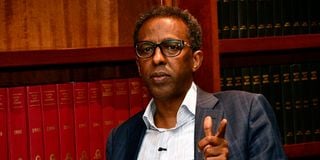
Senior Counsel Ahmednasir Abdullahi.
The question then is why that information is not being used to inform use of formal structures towards impeachment of allegedly correct judges instead of subjecting the entire edifice to a public lynch mob.
Ahmednasir, an unabashed supporter of Ruto and long-term critic of judicial corruption, provoked controversy of his own by suggesting on social media that the President should emulate the previous government and resort to bribing judges.
The post on X, formerly Twitter, was probably tongue in cheek, but Ruto surprisingly found it fit to respond on the same platform, asserting that he would not be parting with a single cent to win judges.
Another response came from Ahmednasir’s fellow senior counsel and former Kikuyu MP Paul Muite, who agreed that the Uhuru government used to bribe judges, but cautioned Ruto that two wrongs don’t make a right.
Ahmednasir is a controversial figure in his own right. He has been an outspoken critic of alleged corruption and incompetence in the Judiciary, particularly under the Koome regime.
But pressed on details and proof of specific instances of money changing hands in either the cases that have miffed Ruto or any other cases, he hedged, retreating to the “it is common knowledge” defence.
He also conceded that he has not used whatever information he has on corrupt judges to formally push for inquiries into misconduct, pleading that deals are conducted under the table and therefore getting evidence is very difficult.
Mutunga, who served as the first Chief Justice and President of the Supreme Court under the 2010 constitution, agreed that while there may be corruption in the Judiciary, blanket condemnation without evidence or due process is not helpful.
He said he has urged Ahmednasir to table evidence and move formal motions against allegedly corrupt judges instead of waging social media wars.
The two make for an interesting pair. Ahmednasir, as a member of the Judicial Service Commission (JSC), played a key role in Mutunga’s appointment as Chief Justice.
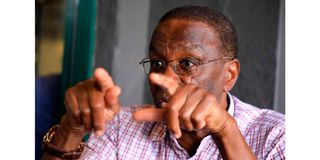
Former Chief Justice Willy Mutunga during an interview with the Sunday Nation in Nairobi on October 22, 2021.
It was evident during the public interviews for the post that he was the one panelist who had done his homework. Keen observers noted that it often looked like the two were part of a tag team during the interviews.
He revealed in his conversation with The Weekly Review that at the time, the new JSC wanted a clean break with the past by appointing to the new Supreme Court figures who had not been tainted by association with the discredited Moi-era Judiciary.
Serving Court of Appeal and High Court judges were deliberately shut out to pave way for newcomers, particularly from academia. Part of the rationale was that the Supreme Court required much more advanced brainpower than the mere taking and weighing of evidence.
It was about a court that could shape judicial philosophy, hence the appointment of figures like professors Smokin Wanjala and Jackton Ojwang from the University of Nairobi, and former nominated MP Njoki Ndung’u with a background in civil society. Then there was Mutunga himself, whose career spanned teaching at the University of Nairobi, detention and exile under the Moi regime for alleged subversive activities, and civil society activism that in many ways helped birth the return of the multiparty State, exit of the Moi regime, and adoption of the 2010 constitution.
Now, Ahmednasir rues that the outsiders he helped bring into the Judiciary are worse than the previous lot. He is particularly critical of Koome, whom he says lacks the intellectual gravitas required of a Chief Justice, and has done nothing to reform the Judiciary since taking the helm in 2021.
While Ahmednasir is an enthusiastic proponent of the drive against judicial corruption, he is unsure that Ruto has the political will to proceed to a logical conclusion. He conceded that corruption in the Judiciary is not easy to fix.
“We failed with Kibaki’s radical surgery, we failed with vetting under the 2010 constitution,” he said, pleading that he has no solution, but that Ruto has opened the space for public discussion.
Ahmednasir is both an insider and outsider in legal circles. As one of the most well-connected lawyers in Kenya, he attracts the cream of high-profile clients, but openly rubs judges the wrong way with his sustained attacks on their performance. Some call it intimidation.
So does he also win cases through bribery? No, no no, he protested, saying that if he was in that game, he would not be attacking judges the way he does. He cited instances where his intervention in papers or social media made judges refuse to give him audience unless he apologised.
“I made a conscious decision from day one (to fight judicial corruption) and that’s my struggle till today,” he said.
The “radical surgery” of 2003 was due to change of regime, a paradigm shift in governance and politics, and Kibaki’s reformist agenda.
Ahmednasir, however does not see much on agenda now.
“William has not told us he has a reformist agenda. He has problems with the Judiciary because of one or two things, but no agenda,” he said.
His view is that Ruto now has the opportunity to push for judicial reforms in a context that Kenyans will appreciate, but that must be based on something more solid than having lost a few cases.
His conclusion is that Ruto and his mouthpieces are making all the noise, but he doesn’t see the government having a clear policy decision on how to nail corrupt judges.
“If they have the will, we can clean the Judiciary in a week,” he said.
Mutunga is equally sceptical of a fight that seems more grounded in politics rather than actual evidence of judicial misdeeds. He, however, prefers to take the problems right back to the colonial era when the Judiciary served as an arm of the State.
Even after independence and throughout the Jomo Kenyatta and Daniel arap Moi regime, the Judiciary was enslaved by the State, with presidents that presumed to be above the law.
The 2010 constitution therefore sought to deal with relations between the President and the Judiciary. It emphasised that the Judiciary and other independent offices and institutions cannot take instructions from any other quarters, and did away with the concept of an imperial presidency.
“If they (presidents) respected our constitution, they would know that the Judiciary must be obeyed, if not, that is subversion of the constitution, overthrow of the constitution,” Mutunga said.
If parties are aggrieved by court decisions, they have recourse in the appeals process, he pointed out. Otherwise, he said, the President, like everyone else, has every right to criticise the Judiciary, which must also be open to scrutiny.
The problem is that the President should have access to information on judges who are corrupt, and it should be a simple matter of filing petitions for their removal.
“I had an issue with Uhuru when he refused to swear in judges claiming he has information they are corrupt. I told him to take that information to the JSC so they can be removed. We can’t force judges out on gossip,” he said.


